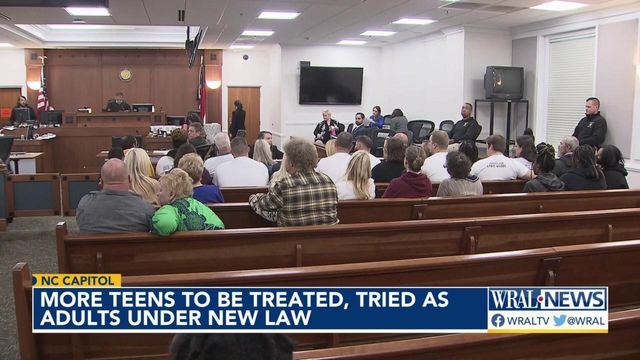More teens to be tried, treated as adults under new NC law
A bipartisan bill signed into law this week makes some big changes to the juvenile justice system in North Carolina, requiring more juveniles to be tried in adult court and making it easier for police to search for them.
Supporters say the changes in House Bill 186 are needed because of a large uptick in violent crime among juvenile offenders last year, but critics say it's eroding juvenile justice reforms made in 2017 and before.
One part of the new law is named “Lyric and Devin’s Law” after Lyric Woods and Devin Clark, the two teens who were killed by another teenager last year in Orange County.
North Carolina Sheriffs’ Association General Counsel Eddie Caldwell says law enforcement knew who the suspect was, but they couldn’t put out a bulletin on him because he was younger than 18 years old.
"Shortly after he killed the two teenagers, they got reliable information that he had gone to Delaware," Caldwell told WRAL News. "And so then they were in a situation where they're looking for a teenager in Delaware. And they can't tell anybody the teenager's last name, they can't publish photographs."
The new law allows a judge to decide whether to release names, photos and other information about juveniles who are suspected of violent crimes and could pose a threat to public safety or to themselves. In emergency situations, it will allow law enforcement to release that information without a court order.
The intent of the original law, which Caldwell says has been on the books for decades, was to protect the identity of juveniles. "But when you've got somebody that's committed a murder, they've sort of given up all rights to anonymity,” he said.
Another section of the new law requires 13- to 15-year-olds accused of first-degree murder to be tried in adult court, not juvenile court, if they're indicted by a grand jury, or if a judge finds probable cause that they committed the crime.
That change comes after the mass shooting in Raleigh’s Hedingham neighborhood last year, when police say a 15-year-old killed five people and injured two others.
Under current law, the suspect, Austin Thompson, would have had to be tried in juvenile court first before the case could be moved to adult court. The new law skips that step.
It will also require 16- and 17-year-olds to be tried as adults for violent crimes like armed robbery, rape or manslaughter, repealing some of the discretion current law gives to prosecutors in those cases.
"It's a response to some of the headline cases we've seen," said Rep. Marcia Morey, D-Durham, a retired judge and advocate for juvenile justice reform.
Morey noted that North Carolina was the last state in the country to treat 16-year-olds as adults in the criminal justice system until 2017, when the "Raise the Age" law changed that.
"We decided in 2017 that with brain development, age development, it was appropriate to treat 16 and 17 year olds in the juvenile system," Morey told WRAL News. "What we're seeing here is chipping away at that premise."
Morey noted that the changes will allow prosecutors to bypass the juvenile justice system entirely, leaving those accused without the protections and confidentiality the juvenile system offers.
"'It's just becoming just more Draconian that it doesn't matter what age you are, if it's a bad offense, they're gonna hold them accountable and have their names public," she said.
However, Caldwell said it's a reflection of what law enforcement and prosecutors are seeing.
"Younger and younger children are committing more and more serious crimes," he said.
The new law takes effect Dec. 1. It is not retroactive.











